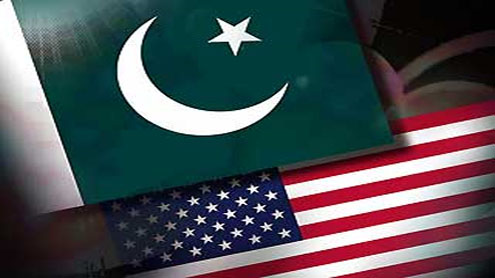 Relations between the United States and Pakistan have continued to fray since a US Special Forces team killed Osama bin Laden in a comfortable villa near a major Pakistani military academy. But the tit-for-tat retaliation that has followed the raid reflects deeper sources of mistrust and mutual suspicion. The latest round has focused on the alleged activities of the Pakistani military’s powerful intelligence agency, Inter-Services Intelligence (ISI), in the United States. ISI is accused of watching over the Pakistani diaspora and of sponsoring unregistered lobbyists working to shape congressional opinion.
Relations between the United States and Pakistan have continued to fray since a US Special Forces team killed Osama bin Laden in a comfortable villa near a major Pakistani military academy. But the tit-for-tat retaliation that has followed the raid reflects deeper sources of mistrust and mutual suspicion. The latest round has focused on the alleged activities of the Pakistani military’s powerful intelligence agency, Inter-Services Intelligence (ISI), in the United States. ISI is accused of watching over the Pakistani diaspora and of sponsoring unregistered lobbyists working to shape congressional opinion.
Indeed, this is not the first time that Pakistan’s relations with the US have been on a slippery slope. In 1965, after helping the country to build up its economy and its military strength, the US walked out over the war with India that Pakistan had provoked by sending “freedom fighters” into Kashmir.In 1989, following the Soviet Union’s exit from Afghanistan, the US lost interest in what it now calls AfPak – Afghanistan-Pakistan. The Americans began returning to Pakistan until, in 1998, the Pakistani government decided to follow India in testing an atomic bomb.
This led to the imposition of US sanctions – and America’s third exit from Pakistan.That situation remained unchanged when Afghanistan-based Al Qaeda struck America on September 11, 2001. After receiving a “you are either with us or against us” warning from President George W. Bush’s administration, General Pervez Musharraf’s Pakistan decided to side with the US. It severed relations with Afghanistan’s Taleban regime, which it had helped to install five years earlier, and allowed America to use its air space to launch strikes on Afghanistan.
For more than a decade, Pakistan and the US were close allies. Pakistan let the US use its air bases to launch drone attacks on Taleban fighters in Afghanistan and northwestern Pakistan; allowed its territory to be used as a supply route for NATO forces in landlocked Afghanistan; and, less enthusiastically than the US wished, launched military operations against Taleban sanctuaries on the Pakistani side of the porous border with Afghanistan.
In return for its help, Pakistan received large doses of economic and military assistance. According to the US Congress, Pakistan was provided $20 billion in aid between 2001 and 2011. In addition, Congress passed the Kerry-Lugar bill, which promised $7.5 billion in economic aid from 2009-2014. The US also encouraged the International Monetary Fund to give Pakistan emergency financial assistance equivalent to $11 billion, to be disbursed starting in late 2008.
This cozy relationship created a “moral hazard” in Pakistan, as the generous flow of US aid insulated the government and military from any sense of urgency about economic reform: some foreign friend would always rescue the country from its perennial shortage of cash. So far, that friend has been America, but the US could well pull out of Pakistan for the fourth time in the countries’ turbulent relationship – a threat that several influential figures in the US Congress have already made.The dynamic that has brought Pakistan-US relations to this point arguably began on December 1, 2009, when President Barack Obama, announcing a surge in the number of US troops in Afghanistan, also indicated his intention to start pulling back American troops beginning in July 2011 – a pledge that he reiterated two months ago. This alerted Pakistan to the fact that, with the imminent departure of US troops, it would be left alone to fight the insurgency on both sides of its border with Afghanistan. To do that, Pakistan would need help from some of the Afghan Pashtun tribes with which it had developed strong relations during the war against the Soviet Union.
The Jalaluddin Haqqani group, which was allowed to base itself in a sanctuary in Pakistan’s North Waziristan tribal agency, was one such ally that Pakistan’s government thought could be used to further its interests in Afghanistan. But the Haqqanis were also the group that threatened the Americans the most. The US pressed Pakistan to move against them. Pakistan resisted. And, in the midst of this tussle, the US sent Navy Seals to find Bin Laden at a compound deep in Pakistani territory, informing Pakistan’s government only after the raid was over.Pakistan’s embarrassed military pressed the government to begin distancing itself from the US. After the identity of the CIA’s station chief in Pakistan was exposed, America made it known that it had good evidence that a prominent Pakistani journalist was ordered murdered by ISI.
This time around, the break between the US and Pakistan might not be easily repaired. Pakistan has turned to China for economic and military help, clearly hoping for a less volatile relationship than the one that it has with America. On one hand, Pakistan is seeking large investments from China to improve its physical infrastructure and exploit its considerable mineral wealth.
On the other hand, the Chinese have been invited to develop Gwadar port on the Balochistan coast, and to use it as a base for their fast-expanding navy.While China has not responded to these overtures with the degree of enthusiasm that accompanied them, the Chinese would be happy to fill the strategic vacuum likely to be created by America’s accelerated departure from AfPak. A major realignment of forces in the region is looming, and, with it, a new round of Asia’s old Great Game. – Khaleejnews












